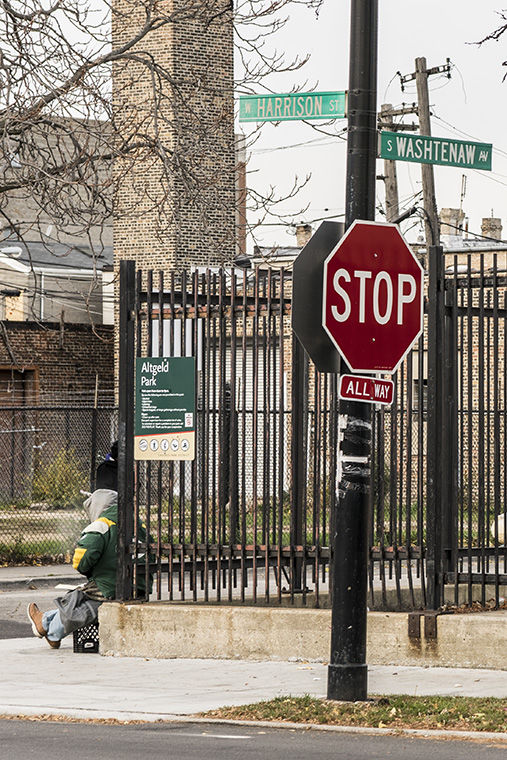Residents concerned about homeless in Altgeld Park
According to Illinois Sex Offenders Registry records, 13 registered sex offenders have a homeless shelter near Altgeld Park listed as their address, causing concern from locals.
November 28, 2016
North Lawndale residents stopped using Altgeld Park in North Lawndale because of the large number of homeless people, said several locals alarmed by the recent uptick.
The homeless, who spend their nights in a nearby shelter, may include registered sex offenders, residents say, and the shelter has not properly investigated these residents.
“[The homeless] stay in the park all day,” several locals said. “They are drinking, doing drugs and sleeping [in the park].”
Residents said the homeless population comes primarily from a 257-bed Franciscan Outreach Association shelter at 2715 W. Harrison St., near the park.
FOA supports and provides resources to more than 7,000 homeless people a year in Chicago and offers those in need a place to sleep, meals and case management, according to Laura Reilly, the organization’s director of development.
According to the Illinois Sex Offender Registration records, 13 homeless individuals on the registry list the shelter as their home address. Two of them have assaulted minors, five are listed as sexual predators and two have been convicted of rape.
The shelter provides homeless individuals with an address in order to obtain resources, such as an ID and mail, according to Reilly.
“We help people by giving them access to the resources they need in order to improve their lives,” Reilly said.
Six of the registered sex offenders have failed to report a change of address, which could indicate some who list the homeless shelter as their address may not still live there, according to Illinois Sex Offender Registration records.
North Lawndale residents Kimberly Griggs, who owns a local cleaning service, and Sandra Brown, a daycare provider, said parents are hesitant to take their children to the park because registered sex offenders may be there. They said homeless shelters, such as FOA, have a responsibility to conduct background checks on the people they take in to ensure the community’s security.
“We cannot have sex offenders in the vicinity of children,” Brown said.
FOA does not conduct background checks on individuals it serves because the organization was founded to provide help to the “most vulnerable people in Chicago,” which at times may be those who served prison sentences, Reilly said.
“We provide a safe place for people to go and get the assistance they need to make positive changes in their lives,” Reilly said.
Keith Sanders, the athletic director at the Chicago Hope Academy, a college preparatory high school, 2189 W. Bowler St., said many homeless people are in the park overnight because the shelter is closed during the day, and they do not want to miss an opportunity to stay in the shelter the next night.
Sanders, whose organization uses the football and soccer field at the park, said he has had parents express concerns and ask him to keep a close watch on their kids when at the park.
FOA has a 65-bed annex shelter, 200 S. Sacramento Blvd., but it is not an option during the day.
Griggs said she would like to see the city direct more resources toward the homeless in Chicago, so the homeless would not have to stay in neighborhood parks. She added the city, homeless shelter and community should come together to find a solution.
Reilly said FOA already works with the Chicago Alternative Policing Strategy and goes to neighborhood meetings in order to educate the general public about the difficulties facing the city’s homeless population and how to provide assistance.
Brown and Griggs said the Department of Family Support and Services and Ald. Jason Ervin (28th Ward) have been unresponsive to complaints filed about homeless in the park. DFSS and Ervin did not respond to requests for comment as of press time.
“They had made a promise to come out a few times [a month ago], but they had only been out once,” Griggs said.
Griggs attributed this to the fact that North Lawndale is not considered an “important” part of the city.
“I have empathy for the homeless, but the kids in the community should be able to use the park and feel safe,” Griggs said.








